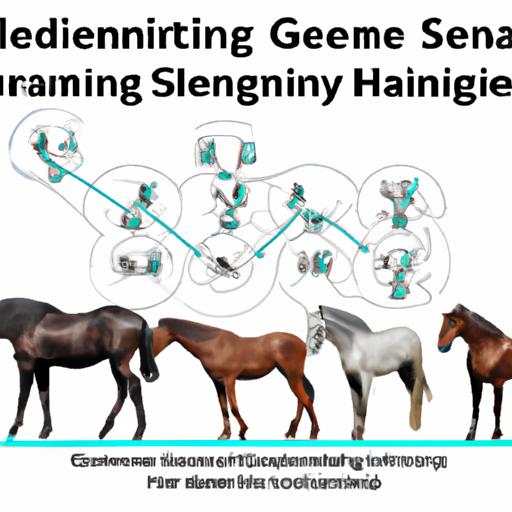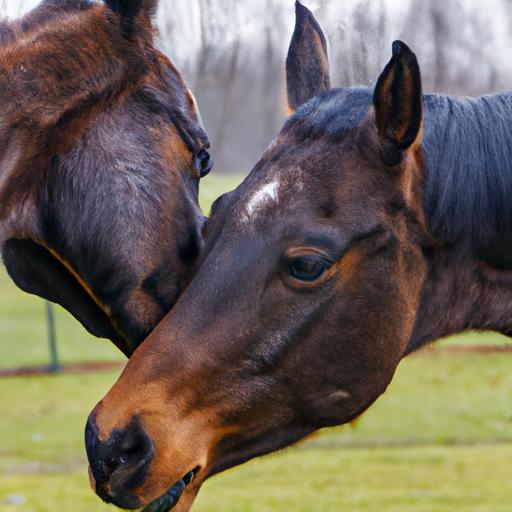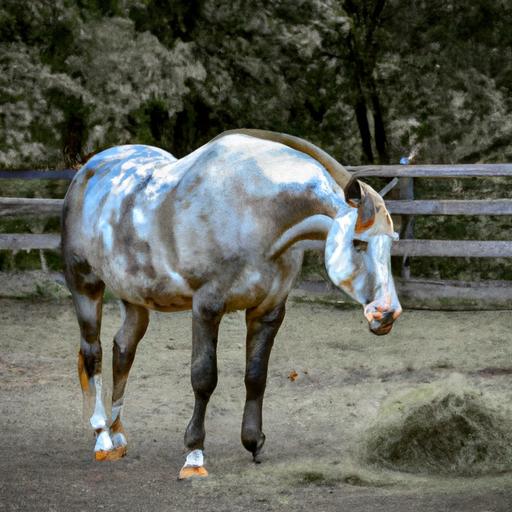Uncover effective strategies for managing horse inherited behavior, modifying unwanted traits, and harnessing positive reinforcement in equine training.
Introduction

Have you ever wondered why horses exhibit certain behaviors? From their graceful movements to their instinctual reactions, horses possess a rich tapestry of inherited behavior that shapes their interactions with the world around them. Understanding these innate qualities is crucial for horse owners and trainers alike, as it allows us to forge a stronger bond with these majestic creatures. In this article, we will delve into the realm of horse inherited behavior, exploring its significance in deciphering equine behavior patterns and shedding light on the intricate relationship between nature and nurture.
Horse inherited behavior refers to the set of traits and actions that horses inherit through their genetic makeup. Just like us, horses inherit a range of characteristics from their parents, including physical attributes and behavioral tendencies. These inherited behaviors can play a pivotal role in how horses navigate their environment, interact with humans, and even respond to training.
Understanding the influence of genetics on horse behavior is crucial for horse owners and trainers. By recognizing and appreciating the genetic factors at play, we can tailor our approach to training and handling, optimizing our interactions with these magnificent creatures. Whether you are a seasoned equestrian or a novice horse enthusiast, delving into the world of horse inherited behavior will unlock new dimensions of understanding and enhance your horsemanship skills.
So, join me as we embark on a journey to unravel the mysteries of horse inherited behavior. Together, we will explore the common inherited behaviors observed in horses, delve into groundbreaking genetic studies in the field, and discover effective strategies for managing and modifying these behaviors. By the end of this article, you will be equipped with the knowledge and insights to build a stronger bond with your equine companion, harnessing their inherited traits to create a harmonious partnership.
Stay tuned for the next section, where we will dive deeper into the common inherited behaviors observed in horses. Get ready to uncover the fascinating world of equine genetics and behavior!
Understanding Horse Inherited Behavior

Definition and Explanation of Inherited Behavior in Horses
To truly comprehend horse inherited behavior, we must first define and unpack its essence. Inherited behavior refers to the set of instinctual actions and responses that horses are born with, passed down through their genetic makeup. These behaviors are not learned or acquired through experience but are rather innate qualities with which horses enter the world.
Inherited behaviors in horses can manifest in various ways, encompassing both physical and psychological traits. They can include natural gaits, such as the graceful trot or powerful canter, as well as instinctual reactions, like flight or fight responses. By understanding these inherent qualities, we gain valuable insights into the inner workings of our equine companions.
Genetic Factors Influencing Horse Behavior
The influence of genetics on horse behavior cannot be understated. Just as certain physical traits are passed down from generation to generation, so too are behavioral characteristics. Horses inherit a combination of genetic material from their parents, which contributes to their unique disposition and predispositions.
Genetic factors play a significant role in shaping horse behavior, including temperament, trainability, and even specific skills or talents. For example, certain horse breeds may have a genetic inclination towards athleticism, making them well-suited for activities like jumping or dressage. By understanding these genetic predispositions, we can tailor our training methods to capitalize on a horse’s natural abilities.
Role of Nature vs. Nurture in Shaping Equine Behavior
The age-old debate of nature vs. nurture also applies to horse behavior. While genetics lay the foundation for a horse’s innate qualities, environmental factors and experiences can also shape their behavior. The interplay between nature and nurture is complex, with both factors contributing to the final outcome.
While genetics provide the blueprint, it is through interaction with their surroundings, training techniques, and socialization that horses develop and refine their behaviors. Understanding this dynamic interplay allows us to recognize the significance of early experiences and proper handling in shaping a horse’s behavior.
In the next section, we will explore the common inherited behaviors observed in horses, shedding light on the fascinating traits that horses inherently possess. Get ready to unravel the secrets of equine nature and discover the wonders of horse inherited behavior.
Common Inherited Behaviors in Horses
Horses possess a myriad of common inherited behaviors that are deeply ingrained in their genetic makeup. These behaviors, which vary from individual to individual, are instrumental in shaping their interactions with the world around them. By understanding these common inherited behaviors, we can gain valuable insights into the nature of horses and adapt our training and handling techniques accordingly.
Overview of Common Inherited Behaviors
One of the most prevalent inherited behaviors in horses is their flight response. This instinctual reaction stems from their evolutionary history as prey animals. When faced with a perceived threat, horses may instinctively flee, relying on their speed and agility to escape potential danger. Understanding this innate behavior allows us to approach training with patience and empathy, as we work to build trust and confidence in our equine partners.
Another common inherited behavior in horses is herd mentality. Horses are social creatures that thrive in the company of their peers. This behavior is deeply rooted in their ancestral survival instincts, where banding together provided protection from predators. Recognizing and respecting their need for social interaction enables us to create a supportive environment that fosters their well-being.
Examples of Genetically Influenced Behavior Traits
Certain behavior traits in horses are believed to be genetically influenced. For instance, some horses may exhibit a predisposition towards being more excitable or nervous, while others may have a calmer temperament. These traits can impact how horses respond to various stimuli, training methods, and their overall suitability for certain disciplines. By understanding the genetic predispositions of individual horses, we can tailor our training approaches to suit their unique needs, ensuring a harmonious partnership.
Impact of Inherited Behavior on Training and Handling
The influence of inherited behavior on horse training and handling cannot be overstated. Recognizing that certain behaviors are deeply rooted in their genetic makeup allows us to approach training with empathy and patience. By adapting our methods to accommodate their innate tendencies, we can foster a positive and cooperative learning environment. Additionally, understanding the impact of inherited behavior can help us identify potential challenges and develop effective strategies to modify or redirect unwanted behaviors.
In the next section, we will explore the fascinating world of genetic studies conducted on horse inherited behavior. By delving into the scientific realm, we can gain deeper insights into the complexities of equine behavior and its genetic underpinnings. Join me in the next section as we unravel the secrets hidden within the horse’s genetic code.
Genetic Studies on Horse Inherited Behavior
Exploration of Scientific Studies and Research
Scientific studies and research have played a pivotal role in unraveling the intricate relationship between genetics and horse inherited behavior. Researchers across the globe have dedicated their efforts to understanding the genetic factors that influence equine behavior, providing valuable insights into this fascinating field.
These studies involve examining the heritability of specific behaviors in horses, as well as identifying genetic markers associated with certain traits. Through careful observation, data collection, and analysis, researchers have been able to shed light on the genetic underpinnings of various equine behaviors, including social interactions, fear responses, and learning abilities.
Findings and Conclusions
The findings from genetic studies on horse inherited behavior have been intriguing and enlightening. They have revealed that certain behaviors, such as herd cohesion, response to stress, and even specific gaits, have a significant genetic component. These studies have also highlighted the interplay between genetic factors and environmental influences, emphasizing the importance of both nature and nurture in shaping equine behavior.
Furthermore, researchers have identified specific genes and genetic markers associated with certain behaviors in horses. By studying these genetic markers, scientists can gain a deeper understanding of how certain behaviors are inherited and potentially predict behavior traits in future generations. This knowledge has profound implications for horse breeding programs, as it allows breeders to select for desired behavioral traits and improve the overall temperament and trainability of horses.
Importance of Genetic Studies
Genetic studies on horse inherited behavior are of utmost importance for horse owners, trainers, and the equine industry as a whole. By understanding the genetic basis of equine behaviors, we can make informed decisions regarding breeding, training, and management practices. This knowledge empowers us to develop effective training techniques tailored to each individual horse, harnessing their innate qualities and maximizing their potential.
Additionally, genetic studies contribute to the broader field of animal behavior and genetics, providing insights that extend beyond the realm of horses. The knowledge gained from these studies can be applied to other species, improving our understanding of inherited behavior in various animals and enhancing our overall comprehension of the natural world.
In the next section, we will explore strategies for managing and modifying inherited behaviors in horses. Join me as we discover practical techniques to navigate these behaviors and develop a harmonious relationship with our equine companions.
Conclusion
As we conclude our exploration of horse inherited behavior, we have uncovered a deeper understanding of equine nature and the impact of genetics on their behavior. By appreciating the significance of inherited behavior, horse owners and trainers can forge a stronger partnership with their equine companions.
Throughout this journey, we have learned that managing and modifying inherited behavior requires a thoughtful approach. Strategies such as providing a suitable environment, consistent training, and positive reinforcement play a crucial role in shaping a horse’s behavior. By understanding the genetic predispositions of our horses, we can tailor our training methods and redirect unwanted behaviors effectively.
Remember, every horse is unique, and their inherited behaviors are a part of their individuality. Embracing and working with these inherited traits not only enhances our understanding of their behavior but also fosters a deeper connection with our equine partners. By embracing the power of genetics, we can tap into the inherent potential of our horses and develop a harmonious relationship based on trust and understanding.
At Horsemasterypro.com, we believe in the power of knowledge and education to enhance horsemanship skills. We encourage you to continue exploring the world of horse behavior and inherited traits. By continually expanding our knowledge and staying open to new insights, we can become better horse owners, trainers, and caretakers.
So, let us embark on this journey together, celebrating the wonders of horse inherited behavior, and unlocking the secrets of equine nature. Remember, the more we understand, the deeper our bond with these magnificent creatures can become. Happy exploring!
Stay connected with Horsemasterypro.com for more articles, tips, and resources to enhance your journey as a horse lover and enthusiast.
Join our community and share your experiences and insights. Together, let’s continue to grow and thrive in the world of horsemanship.
Bolded: Horsemasterypro.com


